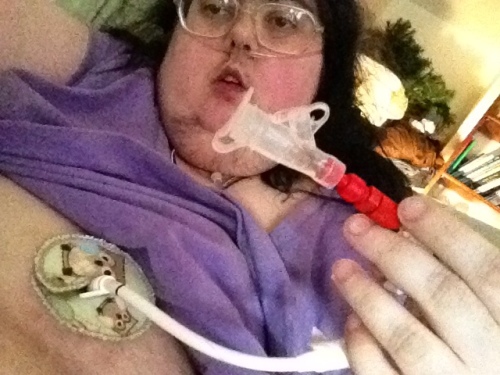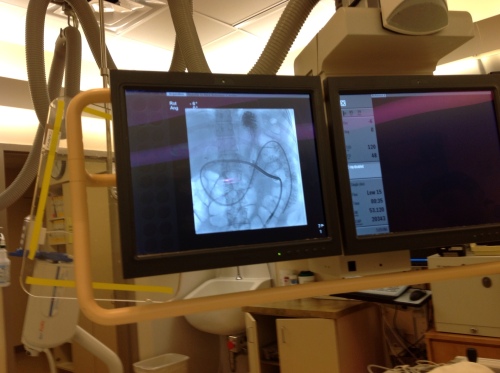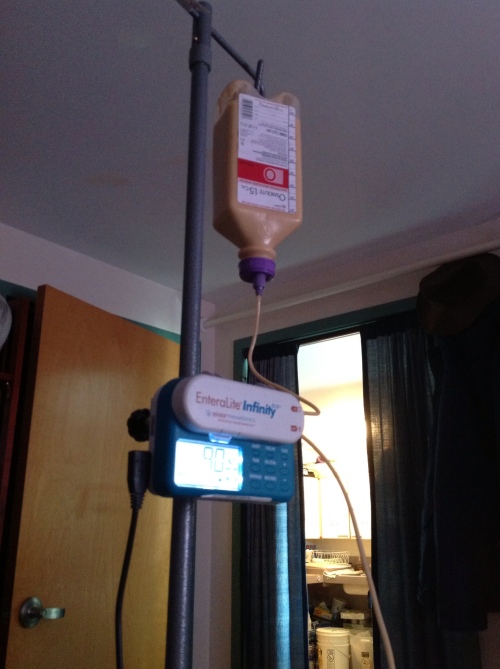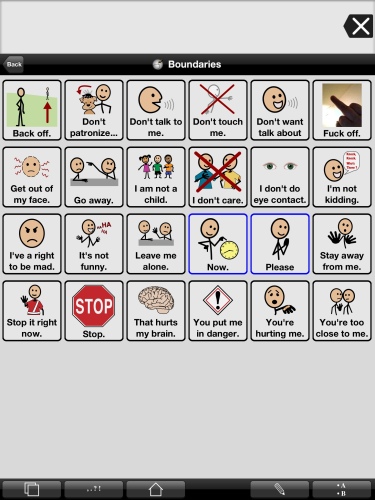


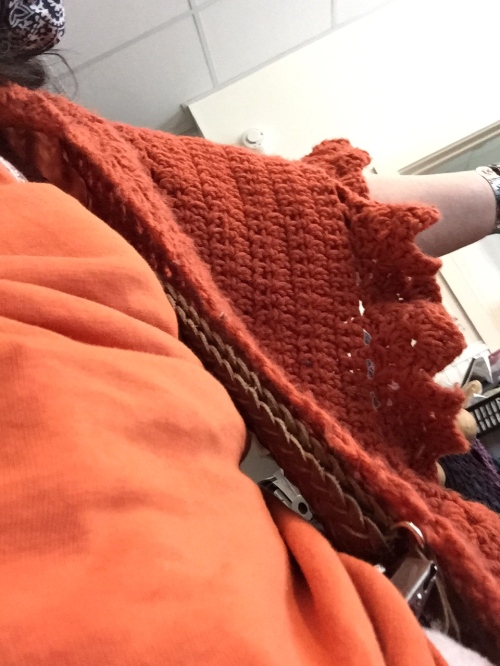

Orange is the color of Autism Acceptance Month. Because it’s the opposite of blue, and blue is the color that everyone is told to wear for Autism Awareness Month. Which kind of sucks because my favorite colors, and nearly all of my clothes, are brown and blue. And I used to really hate orange. Sometimes I hate the term Autism Acceptance, too — I like the idea behind it, but I don’t like the way the term has become a meaningless buzzword in some people’s mouths. Whether it’s parent groups who throw the word ‘autism acceptance’ around to sound current but don’t actually accept the slightest thing about their autistic children, or whether it’s autistic people who’ve fallen in love with the words and forgotten the meaning. Either way, I like it as a concept but not as a buzzword.
Anyway, I hated orange.
Then my father died. I was very close to my father. As a way of remembering him, I began to wear his clothing. My mom sent me a bunch of his shirts, suspenders, watches, and other assorted clothing and jewelry. And I began to wear his clothes, regardless of color.
My father wore a lot of very colorful clothes. I had to get used to that. But most of the colors he had look surprisingly good on me. This did surprise me because his skin was a very different color than mine, much darker. But someone pointed out that while our skin was different in terms of darkness, the actual hue of our skin was nearly identical. Which goes a long way to explaining why nearly any color that looked good on him, looks good on me. The only place we seem to go wrong are on certain pastel shades that just look better against his shade of skin than mine.
Wearing my father’s clothes is more than a symbolic act of remembrance. It helps me get inside of him. It helps me find him inside of me. It helps me find the parts of him that I didn’t even realize were there until he was already dead. There’s something about it that makes me love him even more, makes me comfortable in my own skin, makes me see the many things about us that are alike as well as the differences.
And orange, most of all, has come to symbolize that entire process for me: Finding something totally unexpected about my father that was also inside me all along. Finding that many shades of orange (mostly darker shades, definitely not pastel peach shades) look good on me, sounds like a superficial thing. But when it’s in the context of my father’s death and the meaning he had and continues to have in my life, there’s nothing superficial about it. It’s about as deep as things get. And that’s unexpected as well.
By the way, one thing I never take off is the circular necklace you can see in one of the pictures. It’s a see-through locket containing hairs from my father’s beard, that he agreed to send me before he died. I take it everywhere with me, and even a year ago when I was too delirious to understand that my father had died at all or what the necklace was, I still managed not to lose it despite losing some very important items during the same hospital stay.
So I now appreciate orange a lot more than I used to, and I now have more orange things to wear this month. Both because my father gave me orange clothes, and because since coming to view orange as symbolic of all these things, I have started making myself more orange clothing. The shawl pictured above is something I crocheted myself, and the crochet project I am working on in the last picture will be a cardigan made out of bamboo yarn. I’ve made other orange things as well.
I had other things planned to post this month. I had a lot of things planned. Like the song says, “Life is what happens to you when you’re busy making other plans.” I’ve had tube problems and problems with my steroid levels that have taken up a lot of my time and energy lately. So I think the very long post I had planned for Autism Acceptance Month is going to turn into a Blogging Against Disablism Day post for May 1st. And this post will have to suffice for an Autism Acceptance Month post — right at the end of the month, of course. But all these problems have made my inertia twenty times worse than usual, so getting posts out at all is a miracle and it’s a good thing that the posts I am talking about that I’d planned, are mostly already written months ago, and then stored in anticipation of this month. Because I rightly guessed that I wouldn’t be able to write much for whatever reason when the time actually came around to have things ready.
Orange also stands for fire. I used to think that fire meant the kind of anger problem I used to have, and I was afraid of my own fire. But someone told me that my anger problem was misdirected fire. That real fire, properly channeled, could mean something closer to passion. And that’s when I began to truly integrate fire into who I was, and it flowed through me, and it was something I’d been missing for a long time. Adrenal insufficiency sometimes feels like it tries to drain me of that fire, when I get close to an adrenal crisis, it’s like everything goes flat and deflated. But when fire is properly flowing through me, it feels like finally being alive again. So that’s another thing orange has come to mean to me.
The things I’ve found about my dad in myself, by the way, are not irrelevant to Autism Acceptance Month. My father and I are both autistic, and we share a lot of traits. One of the traits that we share that I treasure the most, is our tendency to communicate with objects. As in, both communicate by means of using objects, and experience communication (it’s the only word that really fits) between ourselves and supposedly-inanimate objects. I knew to some degree this was true of my father, but it became much more apparent as he was dying, and even more apparent when I received many of his belongings after he died. I arranged some of them into a memorial shrine, and any time I want to see him all I have to do is look through the objects and I can always find him by sensing the connections between them.
Not a lot of autistic people talk about this, but a lot of autistic people very much do things like this. And many people have told me they look at objects differently after seeing how I have interacted with objects after my father’s death. People are used to seeing objects as dead in themselves. And they are used to seeing interaction with objects as inferior to interactions with people. They are used to seeing attachment to objects as an ‘attachment to material possessions’, like a consumerist thing. So they are legitimately surprised when they see someone doing it completely differently than anything they’ve ever seen before.
Some people react well to that and some people react badly. I’ve been lectured more times than I care to count, on how objects are not really alive and you can’t really interact with them. Usually they talk to me in the same way they would talk to a five-year-old who believes in unicorns. Other people have explained anthropomorphism to me at great length, totally neglecting the fact that I’m not in fact attributing human qualities to objects. I interact with them, they interact back, I see them as alive, but being alive is not a human-specific quality. And they are alive in a very specific way that has nothing to do with humans and nothing to do with the actual categories of animate and inanimate beings in general, and I interact with them as what they are to a degree that most people who see them as dead probably don’t.
And usually the person doing the explaining manages to be incredibly condescending both to people like me, and to cultures that don’t differentiate as much between living and non-living creatures as modern Western culture does, or differentiate much differently. The view is that we’re just simple-minded idiots who don’t yet know enough, aren’t yet highly evolved enough as a person or as a culture or both, to have figured out what Western science knows. Never mind that their view of how we see things is usually mind-bogglingly simplistic in and of itself.
For some reason, such people seem to feel almost compelled to force their worldview on me. Like I’m just one tiny little person who happens to be moving through a world full of people who mostly don’t share this worldview. I’m hardly a threat to anyone. But they seem to feel threatened enough that they have to quash any sign of difference anywhere they see it. And I’m not just talking about nonautistic people, I’m also talking about autistic people who don’t happen to share this particular autistic trait. (Because no autistic trait is universal, and quite often autism involves opposites a lot — so that both a trait and its polar opposite will be common autistic traits. Sometimes even both showing up in the same person at different times.)
But what really amazes me are the people who are willing to have their mind changed about objects after they see how I interact with them. They see that there is respect there. They see that there is depth there. They see that like many autistic people with similar traits, I move through a very sensual world full of richness and depth. They see that I use objects to communicate with other people, to say important things that I can’t say with words. They see the way I use objects to remember my father and to interact with him after his death. They see that there is something deeply real here. And they come to respect that, even when they don’t fully understand it.
And I never set out to cause them to respect me. Any more than I set out to convince one of friends that being gay is not a sin. I actually told her I didn’t mind that she thought it was a sin, as long as she didn’t interfere with my life on that basis, and went on living my life around her as I was. She said that just knowing me changed her mind about gay people on a religious level and on other levels. And that’s not something I ever set out to do, in fact I was careful not to set out to change her mind. But it happened anyway. And that’s how this thing with the objects has happened: I never intended it, in fact I never would have known the change was happening in some people if they hadn’t told me in private that I had changed their entire way of viewing how people interact with objects. But they did change their minds because of me, intended or not.
And I think that’s really important. Sometimes people don’t come to accept autism — or aspects of autism, as the case may be — because we’ve been shoving things in their face. Sometimes they come to accept autism, and autistic people, and autistic people’s ways of being in the world, because they spend enough time around us that they get to see us in a well-rounded context. Not in terms of rhetoric but in terms of real life. And seeing us, seeing how we live, seeing that our ways of doing things are legitimate even if they’re different than anything they’ve ever imagined before, that can be far more important for some people than anything we could have to say about the matter.
If saying things weren’t important to me, mind you, I wouldn’t be a blogger. I may be a reluctant writer at times, but I’m definitely a writer. But I also think there’s things in the world far more important than words. And I also think there’s many different ways to communicate something, and writing is only one of them. Not everyone can write, but everyone can make a contribution, deliberate or not, to the acceptance of people like us in the world at large. And as writing this kind of post has become more and more difficult for me — it was never easy, but it’s getting much harder with time — I’m learning to very much value my ability to just exist and get things across by the way I exist around people.
There are a lot of things about being autistic that are hard, and I have to confess that lately it’s the harder things that have caught my attention more often. The difficulty of keeping in touch with even my closest friends, to the point I’ve become almost completely socially isolated lately. The ever-increasing level of inertia, which has snuck up on me because it looks very different after severe adrenal insufficiency completely reshaped the way I experience stress on a subjective level. The stress levels that come not from emotional stress but from the sheer strain of having to function on an everyday basis — walking from one room to another, getting in and out of bed and chairs, going to the bathroom, making words, changing feeding tube dressings upwards of twelve times a day, going to new places that are visually overstimulating, anything involving getting information into or out of my brain, thinking on an intellectual level. Things that most people don’t even know are skills, let alone difficult ones, because most of them are done automatically. And all of these things are contributing to it not always feeling great to be autistic lately.
But orange brought me back to my father, and my father brings me back to objects, and objects bring me back to that rich world that my father and I both take part in. Which brings me back to the way that just being who I am in front of people has changed their entire way of viewing objects and people’s relationships with them. And that’s the good side of autism, and this is one of many ways that autism acceptance — the real thing — can happen. One person at a time, through living our lives as authentically as possible so that people can see exactly who we are and how we do things. And when they see that, when they see who we are and how we live, some of them come to accept us on a deep level. And not a lot of people are talking about that.
So I guess I’m glad for orange after all.
